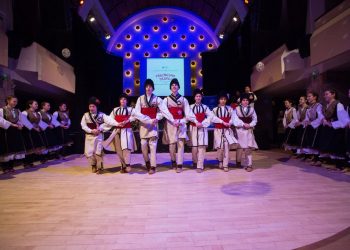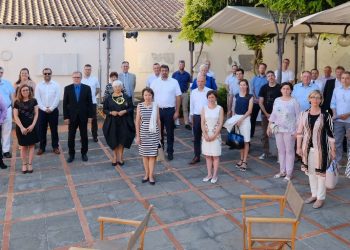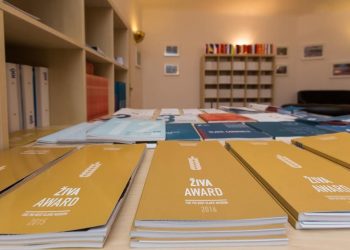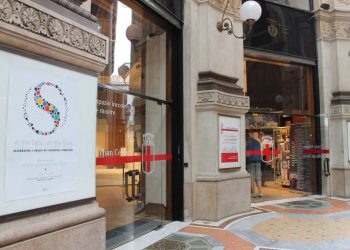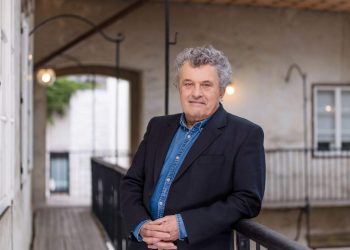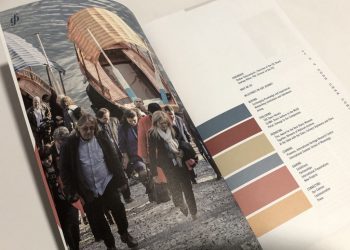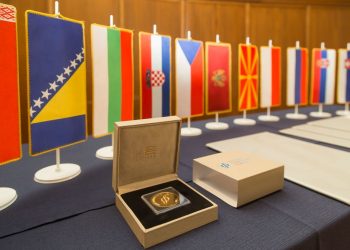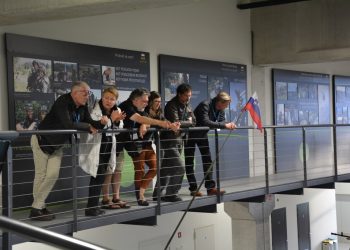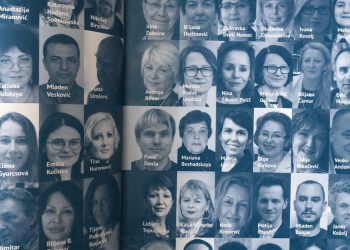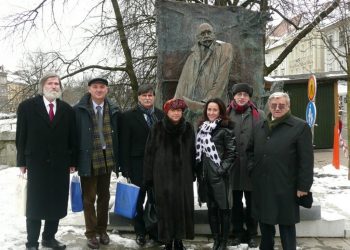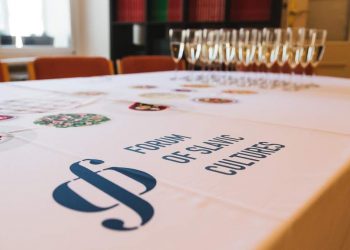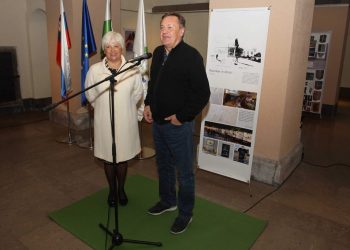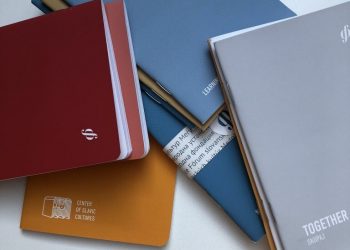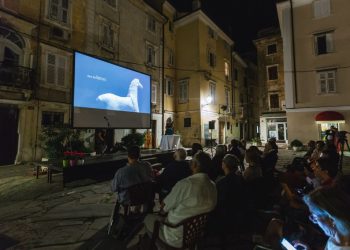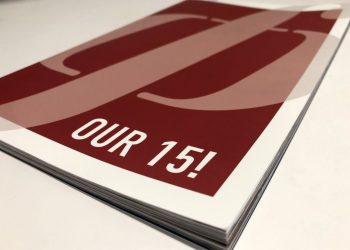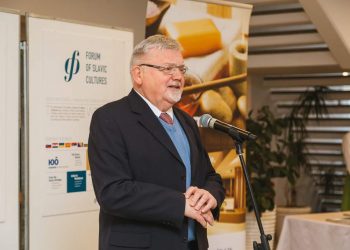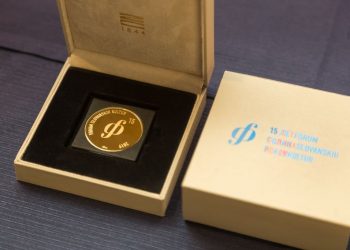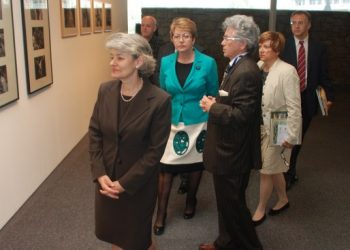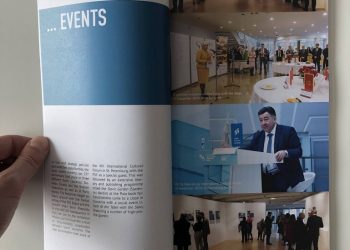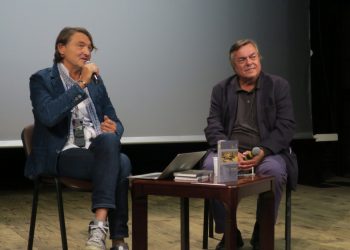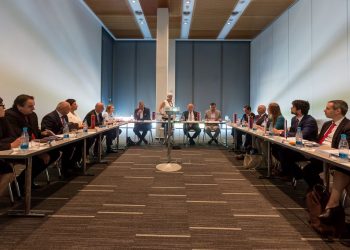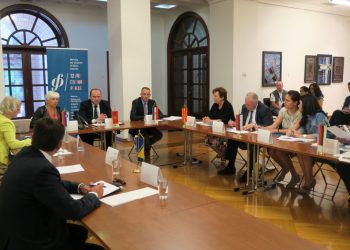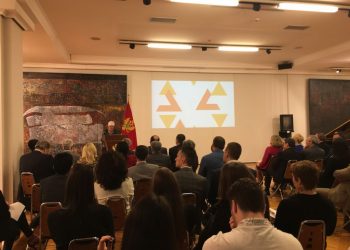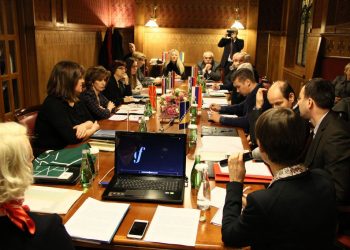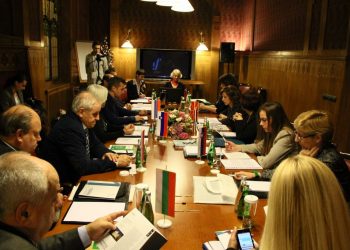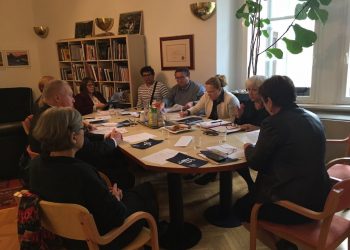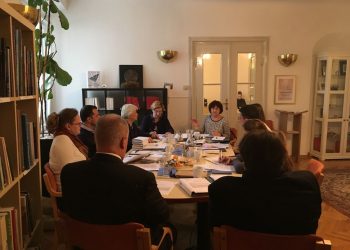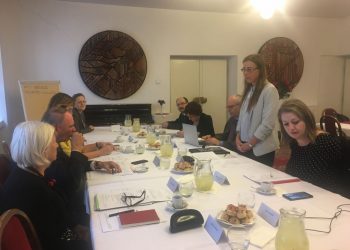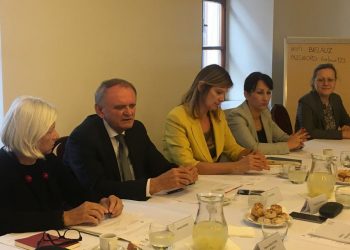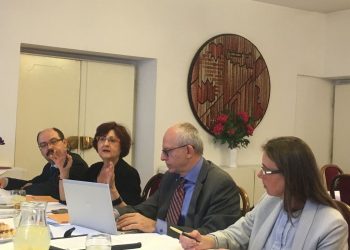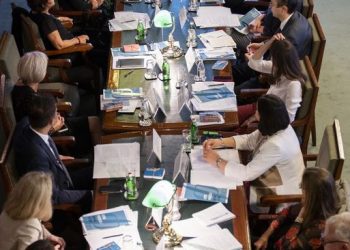За нас
Форумът на славянските култури (ФСК) е международна фондация, организация с нестопанска цел, която извършва дейност в обществен интерес, идеята, за която се зароди в културните среди в началото на 21-и век. Официално фондацията ФСК е основана през 2004 г., а днес вече обединява повече от 300 милиона славяни в тринайсет славянски страни: Беларус, България, Босна и Херцеговина, Чешката република, Черна гора, Хърватия, Северна Македония, Полша, Руската федерация, Словакия, Словения, Сърбия и Украйна.
МИСИЯ
Мисията на ФСК е да възроди творческия потенциал на славянските култури. Основната цел на фондацията е да свързва славянската културна среда и да я застъпва в съвременния глобален социален контекст.
Форумът на славянските култури свързва и представя славянската култура, наука и изкуство, нейния творчески заряд и наследство, като същевременно полага активни грижи за открояване на приноса на славянските култури към глобалния диалог.
ПОДРОБНИ ДАННИ
Наименование: Международна фондация ‒ „Форум на славянските култури“
Съкратено наименование: ФСК ‒ „Форум на славянските култури“
Адрес: Улица 27 април 47, 1000 Любляна, Словения
Тел.: +386 (0)8 205 28 00
Факс: +386 (0)1 256 57 38
Имейл: info@fsk.si
W: https://www.fsk.si
Приемно време: всяка сряда от 10.00 до 13.00 ч.
ИН по ДДС: SI 11734086
Регистрационен номер: 2035618
IBAN: SI56 2900 0005 0604 466 (UniCredit Banka Slovenija d.d., Šmartinska 140, 1000 Ljubljana, Slovenija; SWIFT / BIC: BACXSI22)
ДОКУМЕНТИ
ОРГАНИ НА ФСК
Predsjednica Upravnog odbora FSK-a:
Maja Gojković, potpredsjednica Vlade i ministrica kulture i informiranja Republike Srbije
Članovi
- Boil Banov, ministar kulture Republike Bugarske
- Vesna Bratić, ministrica obrazovanja, znanosti, kulture i sporta Republike Crne Gore
- Olga Ljubimova, ministrica kulture Ruske Federacije
- Nina Obuljen Koržinek, ministrica kulture Republike Hrvatske
- Irena Stefoska, ministrica kulture Republike Sjeverne Makedonije
Председател: Младен Вескович / Сърбия
Членове:
- Гойко Божович / Сърбия
- Дубравка Джурич Немец / Хърватия
- Анатолий Крейдич / Беларус
- Томислав Османли / Северна Македония
- Милорад Попович / Черна гора
- Юлия А. Созина / Руската федерация
Мирослава Валова / Словакия
Членове:
- Александър Арсовски / Северна Македония
- Матеа Бърстило Решетар / Хърватия
- Емилия Лачна / Словакия
- Вера Лубурич / Черна гора
- Аида Шабанович / Босна и Херцеговина*
- Огнян Тодоров / България
- Мирослава Туркович / Сърбия
Predsjednica Upravnog odbora FSK-a:
Maja Gojković, potpredsjednica Vlade i ministrica kulture i informiranja Republike Srbije
Članovi
- Boil Banov, ministar kulture Republike Bugarske
- Vesna Bratić, ministrica obrazovanja, znanosti, kulture i sporta Republike Crne Gore
- Olga Ljubimova, ministrica kulture Ruske Federacije
- Nina Obuljen Koržinek, ministrica kulture Republike Hrvatske
- Irena Stefoska, ministrica kulture Republike Sjeverne Makedonije
Председател:
Дубравка Джурич Немец / Хърватия
Членове:
- Стоянка Атанасова / България
- Андрия Радулович / Черна гора
- Таня Джакович / Босна и Херцеговина*
- Вадим Дуда / Руската федерация
- Татяна Кралевска Лазарова / Северна Македония
- Перина Меич / Босна и Херцеговина*
- Петър Миладинов / България
- Гордан Николов / Северна Македония
- Юлия А. Созина / Руската федерация
- Биляна Тудзаровска Кюпева / Северна Македония
- Младен Вескович / Сърбия
и представители на страните-наблюдателки:
- Вероника Фалтова / Чешката република
- Мирослав Кана / Словакия
- Виктория Ратобилска / Беларус
- Войтех Мерунка / Чешката република
*в покой
Председател: Младен Вескович / Сърбия
Членове:
- Гойко Божович / Сърбия
- Дубравка Джурич Немец / Хърватия
- Анатолий Крейдич / Беларус
- Томислав Османли / Северна Македония
- Милорад Попович / Черна гора
- Юлия А. Созина / Руската федерация
Мирослава Валова / Словакия
Членове:
- Александър Арсовски / Северна Македония
- Матеа Бърстило Решетар / Хърватия
- Емилия Лачна / Словакия
- Вера Лубурич / Черна гора
- Аида Шабанович / Босна и Херцеговина*
- Огнян Тодоров / България
- Мирослава Туркович / Сърбия
ФСК страни
ОФИС НА ФСК
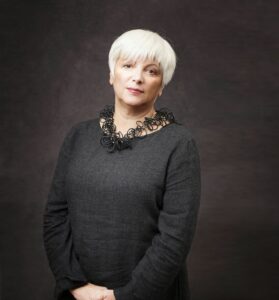
Andreja Rihter, PhD,
Director
E: andreja.rihter@fsk.si
Andreja Rihter was the first President of the Board of the International Foundation– Forum of Slavic Cultures (FSK), serving two terms of office, from its inception in 2004 until 2006 and again from 2008 until 2012, when she was appointed Director of the FSK. She continues to serve as FSK Director today. She is the author of FSK’s first project 100 Slavic Novels, initiator of ŽIVA Award for the best Slavic museum and of the newly developed cultural route project Women Writers Route (WWR) as well as the inceptor of diverse international collaborations between Slavic speaking countries and beyond.
There is an amazing, and growing number of Slavic museums and heritage sites which extend their role in society with a significant local or national impact. That is admirable in itself, but these experiences need to be shared, seen and acknowledged. And the Živa Award – with all its applicants – is a major entrance point for the FSK stakeholders, colleagues and audiences.
The Award serves as a platform for sharing and promoting – in Slavic countries as well as in the broader group of European countries. Both main awards (The Živa Award for the
Best Slavic Museum and the Živa Award for the Best Slavic Heritage Site) are dedicated to the promotion of the protection, preservation, education and communication of museum collections, and of heritage sites, their diversity in type, size and contents as well as their social role by highlighting their innovative and creative approaches, accessibility to the public and openness, their impact on societies, and their contribution to the development of museological principles and ideas.
She obtained her PhD in 2016 with the doctoral dissertation “Heritage of Socialism between Memory and Oblivion” at the Faculty of Arts, University of Ljubljana, after having obtained her master’s degree at the same university in 2008 with her master’s thesis “Development of Tourism in Interwar Celje”.
With a degree in history Andreja Rihter embarked on her professional career in 1981 as a curator at the Museum of Recent History Celje and became its director in 1987.
In 2004, when Slovenia joined the EU, she became the Minister of Culture of the Republic of Slovenia, serving a full term of office. She accumulated more political experience as a Member of Parliament of the Republic of Slovenia between 2008 and 2011. In the same period she was a member of the Parliamentary Assembly of the Council of Europe (2009 – 2011) and President of the Sub-Committee on Cultural Heritage of the Committee on Culture, Science and Sport (2010 – 2011) at the Parliamentary Assembly.
Throughout her career, she has always focused on cultural heritage, history and related activities at the national and international level. In 1991 she became member of the ICOM (International Council of Museums based in Paris) and currently serves as Secretary at the ICOMAM Executive Board (she has been a member of ICOMAM Executive Board since 2016). Upon the founding of the Netherlands-based NGO the European Museum Academy (EMA) in 2009 she became its president and still continues to serve in this capacity. She is also on the panel of judges for the European Museum Awards conferred by the EMA in cooperation with the Micheletti Foundation.
She served as Vice-President of Hands On! – International Association of Children in Museums (2009 – 2019), member of the Board of Directors (2009 – 2015), and currently performs the role of national correspondent.
Before that, in the 1990s, she was very active in Slovenia. She was President of the Museum Association of Slovenia (1998 – 2001), initiator and founder of the School of Museology in Celje (2006) as well as President of the Celje Tourist Association, the oldest tourist association in Slovenia (1997 – 1999).
Andreja Rihter is author of more than 240 scientific, professional and general-interest articles as well as editor of a number of books and catalogues. She regularly attends and organises conferences, roundtables and consultations in Slovenia and abroad.
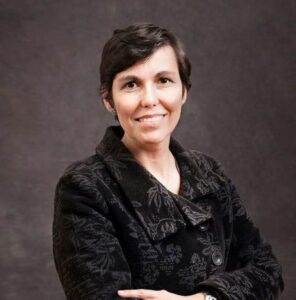
Mateja Jančar
Project Manager
E: mateja.jancar@fsk.si
She graduated in Comparative Literature and Literary Theory and English Language and Literature at the University of Ljubljana. She worked as translator, editor, script writer, PR officer, manager and dramaturg. So far, she has translated nine books and numerous articles, short stories, essays and films. She has experience in project and programme management, organization, publishing, translating and linguistics, and international co-operation.
There is an amazing, and growing number of Slavic museums and heritage sites which extend their role in society with a significant local or national impact. That is admirable in itself, but these experiences need to be shared, seen and acknowledged. And the Živa Award – with all its applicants – is a major entrance point for the FSK stakeholders, colleagues and audiences.
The Award serves as a platform for sharing and promoting – in Slavic countries as well as in the broader group of European countries. Both main awards (The Živa Award for the
Best Slavic Museum and the Živa Award for the Best Slavic Heritage Site) are dedicated to the promotion of the protection, preservation, education and communication of museum collections, and of heritage sites, their diversity in type, size and contents as well as their social role by highlighting their innovative and creative approaches, accessibility to the public and openness, their impact on societies, and their contribution to the development of museological principles and ideas.
Currently she works as a project manager at the International Foundation – Forum of Slavic Cultures; her chief responsibility is the foundation’s literary, publishing and translation programmes. She is also coordinator and Slovenian editor of the 100 Slavic novels series and coordinates the establishment of the new cultural route – Women Writers Route. All project she works on are international and include constant communication in different languages, co-ordination and work in international environment.
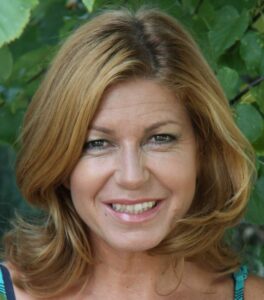
Špela Bogataj
Business Secretary
E: info@fsk.si
After High School of Design and Photography in Ljubljana Špela attended a professional qualification course at Educational Centre Miklošič to become a business secretary. Her first work experience was in a photo studio. She went on to work as a business secretary at the company Arcadia Lightwear, where she helped organise exhibitions and lectures for students and architects.
There is an amazing, and growing number of Slavic museums and heritage sites which extend their role in society with a significant local or national impact. That is admirable in itself, but these experiences need to be shared, seen and acknowledged. And the Živa Award – with all its applicants – is a major entrance point for the FSK stakeholders, colleagues and audiences.
The Award serves as a platform for sharing and promoting – in Slavic countries as well as in the broader group of European countries. Both main awards (The Živa Award for the
Best Slavic Museum and the Živa Award for the Best Slavic Heritage Site) are dedicated to the promotion of the protection, preservation, education and communication of museum collections, and of heritage sites, their diversity in type, size and contents as well as their social role by highlighting their innovative and creative approaches, accessibility to the public and openness, their impact on societies, and their contribution to the development of museological principles and ideas.
She gained experience in working with people, in the field and in the studio, when she joined a casting agency, where she was also in charge of the standard administrative tasks. The next step in her career was opening her own shop with kids’ textiles and accessories, through which she gained extensive experience and knowledge in how to run a business. Throughout her career she developed her business communication skills, and her knowledge of English and Italian helped her to effectively work in different environments. Today she works as a business secretary at the Forum of Slavic Cultures.
ИСТОРИЯ НА ФСК
Форумът на славянските култури (ФСК) е международна неправителствена организация с нестопанска цел, свързваща в международна организационна структура България, Босна и Херцеговина, Хърватия, Северна Македония, Полша, Русия, Сърбия, Черна гора, Словения, Беларус, Словакия, Украйна и Чехия. По време на своето функциониране от 2004 г. насам ФСК се превърна в организатор на активен културен диалог между славянските страни.
Инициативата за учредяване на Форума на славянските култури (ФСК) се възроди през 2002 г. По-широката отправна точка за учредяването бяха съвременните процеси на глобализация и фактът, че славянски страни влязоха в състава на Европейския съюз. През декември същата година в Бърдо при Кран в Словения по инициатива на тогавашния министър на културата на Словения се осъществи неформална среща на министрите на културата на страните, чиито граждани говорят славянски езици. След обширна подготовка и споразумения, те изготвиха съвместно изявление, призовавайки страните да подсилят и насърчат взаимното си сътрудничество в сферата на културата в най-широк смисъл и да ускорят сътрудничеството в европейските и останалите международни организации в рамките на Форума на славянските култури, който да бъде със седалище в Любляна. Международната фондация „Форум на славянските култури“ беше установена през 2004 г. от правителството на Република Словения. Първият управителен съвет на ФСК бе учреден от Словения, България, Босна и Херцеговина, Хърватия, Северна Македония, Полша, Русия, Сърбия и Черна гора. Учредителното заседание на Управителния съвет на ФСК беше на 29-и юни 2004 г. в Любляна. А учредителното заседание на Програмния съвет на ФСК се състоя на 20-и и 21-и март 2006 г. в Любляна.
Двете дългосрочни цели, поставени от фондацията при нейното създаване, бяха:
- Насърчаване на културното сътрудничество между всички славяноезични страни. С обмена на информации и знания и тяхното пряко разпространение в обществеността да способства за по-доброто взаимно разпознаване на участващите страни.
- Насърчаване на развитието на културното сътрудничество между всичките страни по света. Да направи славянските култури видими и атрактивни извън езиковите граници на славянските страни. Да се повиши интереса и по-доброто разбиране на света, особено в рамките на ЕС, както и в останалите езикови области на света.
Още от самото си създаване фондацията насърчава със своите проекти културното сътрудничество, взаимното опознаване и диалога на културните специалисти от славянските страни, които се основават на равноправно участие и не само на езиковия национализъм, представлявал цел на панславизма. ФСК организира своите дейности за сътрудничество в сферата на изкуството, литературата, образованието и научните изследвания.
Важен фактор за формирането на собствената национална култура е осъзнаването на това какво я отличава от другите, макар и доста сходни култури. Ако на собствената си култура гледаме като на изолиран, неповторим феномен, то тогава няма нужда да продължаваме да я развиваме, обогатяваме и да се гордеем с нея пред другите ‒ културните постижения се случват само когато отделяме своята култура от останалите. Но затова първо трябва да познаваме добре другите култури и да им позволим да прекрачат нашия културен праг, защото само в сливането на различни култури наистина ще разберем и правилно ще оценим собствената си специфичност.
Поради геополитическото си положение Словения е „естественият“ инициатор на подобно сдружение ‒ свързване на славяноезичните страни. Тя се намира на западния край на славянския свят и същевременно е членка на ЕС. Наред с интереса към собствената си култура и идентичност, тя донася по-широки свързващи интереси в ЕС, което повишава репутацията ѝ и укрепва силата ѝ в международната общност. Ролята и инициативата на Словения е свързваща и се основава на равноправното партньорство на всички участващи. Културата и художествената продукция на славянските страни са оставили забележителни постижения и осезаеми следи в историята в световен мащаб. Понякога се създава впечатление, че съвременната културна продукция от т.нар. „славянски изток“ е маргинална, че тя все още не е интегрирана в т. нар. „западен свят“ на изкуството. Ние във ФСК твърдим, че творческите сили и артистичният потенциал на страните са по-големи, отколкото би могло да се предположи от тяхното избирателно присъствие в западната художествена система. Затова една от задачите на ФСК е в това да бъдеш актуален именно при поставянето под въпрос на статута на изкуството и културата в по-широк смисъл днес.
През 2012 г. фондацията прие Стратегически план и с него предефинира своята мисия: „ФСК възражда творческия потенциал на славянските култури“; основните дейности на ФСК са и продължават да бъдат:
- насърчаване на обмена на информация в сферата на културата във всички сътрудничещи си страни,
- насърчаване на реализацията на общи проекти в сферата на културата, науката и туризма,
- създаване на образователни програми (под формата на стипендии),
- насърчаване на мобилността на хора на изкуството от сътрудничещите си страни,
- предприемане на инициативи за културни проекти, обмен или гостуване от всички сътрудничещи си страни,
- насърчаване на съвместни изследвания,
- насърчаване на сътрудничеството в сферата на лингвистиката, славянските изследвания като цяло, организирането на конференции, семинари, колоквиуми и други срещи.
По време на учредяването на Международната фондация – „Форум на славянските култури“ записахме:
„Единната/ясна цел на Международната фондация – „Форум на славянските култури“ не е само качествената подкрепа на славянското сътрудничество, но и промяната на обществените условия за открито и плодотворно творчество на славянските култури.“
След 16 години функциониране с радост установяваме, че постигаме целта си и дори я награждаме
Literary writing is an important constituent of national culture, as it has an added value that no other artistic discipline possesses: language, which German Romantic philosophers claimed was the primary source of national identity. It is also what our first project, the 100 Slavic Novels is all about: promoting and strengthening language and cultural exchange, which is even more challenging due to our linguistic kinship and joint “transition”. But the collection aims beyond promoting mutual understanding between Slavic nations, its goal is also to spread the word of the best of Slavic creativity among non-Slavic literature lovers. The project took off in 2006, when members, under the baton of Andreja Rihter, defined the basic parameters of cooperation at meetings in Belgrade in Ljubljana. In the same year, the book series received its visual identity. The first translations came out in Slovenia, Serbia, Slovakia and North Macedonia, and soon after also in Russia. Later they were joined by Belarus, Bolgaria, Croatia and Montenegro.
At the Forum of Slavic Cultures we have been actively involved also in a number of literary festivals: Slavic Bridge (Ljubljana, Strasbourg), Slavic Embrace (Varna – Bulgaria), Struga Poetry Evenings (Struga – Macedonia), Days of Poetry and Wine (Medana, Ptuj – Slovenia) and Stranou (Beroun – the Czech Republic), writers’ meetings at the Tolstoy estate Yasnaya Polyana, Fabula Festival (Ljubljana) and most recently also in the Slavic Garden at the Pula Book Fair(y) (Croatia, 2019). We presented our 100 Slavic Novels at several exhibitions across Europe; among the most notable was the exhibition at the UNESCO headquarters in Paris in 2016, when we celebrated its 10th anniversary. In nearly 15 years of our operation our book series has made an appearance at a number of events, including conferences, round tables, exhibitions and readings in Serbia (2015, 2016, 2017, 2018, 2019), Croatia (2018), England (2016), Germany (2018), Russia (2017, 2018, 2019), China (2016), Montenegro, North Macedonia (2014), the Czech Republic (2017), Slovakia (2018), Austria (2017), Brazil (SLAWA – 2015) and Slovenia (2016, 2017, 2018 PEN, 2019). Between 2010 – 2014 the FSK cooperated with the Public Fund for Cultural Activities in the mobility programme for artists, predominantly writers.
Upon its inception, the Forum of Slavic Cultures defined preservation and promotion of Slavic cultural heritage as one of the priorities of its mission, in particular in terms of ethnography, folklore studies, museology and archival science, highlighting as one of its goals the establishment of study programmes (scholarships) and exchange schemes for curators, restorers and similar, to promote mobility of experts between participating countries.
More systematic activities began in 2006, when the Programme Council adopted its heritage guidelines, but the first concrete projects took place in 2011 when the heritage project group met for the first time:
- preparation and organisation of the first joint exhibition My portrait for the museum, which opened in 2012 at the UNESCO headquarters in Paris. The project involved … institutions from … countries;
- we started preparations for the Živa Award for the best Slavic museum, which was conferred for the first time in Skopje in 2014.
… more - In 2012, in the framework of the Maribor – European Capital of Culture programme and in cooperation with the Assembly of the Council of Europe we organised the conference: The History of Socialism: Film and Technical Heritage.
- In 2006 we organised the first seminars on the training of museum professionals. The first seminar for directors of museums of North Macedonia was held in Ohrid, and was organised by Andreja Rihter with Massimo Negri (EMA) and the Ministry of Culture of North Macedonia. Our seminars continued in North Macedonia in cooperation with ICOM and the Museum of Macedonia, and in Serbia in collaboration with the Gallery of Matica Srpska and the Ministry of Culture. In Slovenia we were actively involved in organising instructional seminars in the framework of the International Summer School of Museology.
Individual educational projects of the International Summer School of Museology in Piran have grown considerably. Since 2018 they take place in the framework of Piranova, International Heritage Research Centre in Piran.
The FSK has been active in education for a number of years, in particular at the international summer school META Humanities, which is organised by the University of Primorska in Koper, and at the International Seminar of Slovenian Language, Literature and Culture, which is organised by the Centre for Slovene as the Second/Foreign Language.
We have been pursuing our primary goal, collaboration in joint projects within our respective countries, also in the framework of the project Together. The project connects state and national archives. This collaboration has generated a number of joint exhibitions, publications and conferences. The FSK co-organised the 1st conference of national archives of Slavic countries in Lipica in 2010 and at the initiative of the state archives began working towards their collaboration.
The first independent conference thus took place in 2015 in Ljubljana and focused on World War I. The second conference took place in Dubrovnik in 2016, in cooperation with Croatian State Archives and ICARUS Croatia. The third conference took place in Warsaw in 2017 in cooperation with the State Archives of Poland. Our collaborations take place also through joint exhibitions: Slavic Capitals in 2D, 2013, at the UNESCO headquarters in Paris, which travelled to Cetinje later the same year, and to Skopje, Belgrade and Sofia in 2014. The archives organised and put on the exhibition Women and the Great War at the UNESCO headquarters in Paris in 2019. The exhibition was opened by Saniye Gulser Corat, UNESCO’s director for gender equality.
Exhibitions are an especially prominent feature of our collaboration with museums and galleries. As early as in 2008, the FSK in collaboration with the Slovenian Ethnographic Museum, ZRC SAZU and the Russian Ethnographic Museum of St. Petersburg organised a very well-received ethnographic exhibition of national costumes in Brussels. The exhibition was accompanied with a film on DVD, Les Slaves de l’Europe by Naško Križnar (ZRC SAZU).
Another notable event was our exhibition of intangible heritage – Slavic Carnivals, which premiered in June 2014 at UNESCO’s headquarters in Paris. It featured 12 museums from 12 Slavic speaking countries and was accompanied with a catalogue. The exhibition opened on 3 June 2014 with inaugural addresses by Mechtild Rossler, Deputy Director of UNESCO’s Heritage Division, Hans Martin – Hinz, president of the International Council of Museums ICOM, Andreja Rihter, Director of the FSK and Bojana Roglej Škafar, Director of the Slovene Ethnographic Museum. In 2015, the exhibition travelled to Pazin/Croatia (Ethnographic Museum of Istria), Belgrade/Serbia (Ethnographic Museum), Banja Luka/Bosnia and Herzegovina (Museum of the Republic of Srpska) and Kotor/Montenegro (Maritime Museum). In 2016, the exhibition visited St. Petersburg/Russia, where it was on show at the Russian Ethnography Museum.
Another important exhibition was a double show World Heritage in the Slavic World (photography) and Slavs. Legends Past and Present (folklore) at the UNESCO headquarters in Paris in 2011. The same year we organised a one-off exhibition on one of the most important artefacts of the Slavic cultural heritage – the 11th-century Codex Suprasliensis, which took place in Brdo pri Kranju. The FSK also helped in the documentary film on the ethnologist and linguist Matija Majar-Ziljski Illusions Lost, we published a history monograph on meetings at the Russian Chapel on Vršič (2007) and the proceedings Slovenian Diplomats in the Slavic World (2010).
Our second goal was pursued through various activities: scientific symposia of the Slovenian Science Institute in Vienna Reformation in Central Europe (2008) and 1989-2009: Religion and a Shift in East and Southeast Europe (2009); we also make regular appearances at the UNESCO headquarters. In addition to said exhibitions we should point out the presentation of At the Table with the Slavs, the first world monograph on Slavic cuisines, in Milan (2015), Beijing (2016) and Jamtli, Sweden (2017). We cooperate with the Council of Europe – Assembly of the Council of Europe, and in the last three years also with the European Institute of Cultural Routes of the Council of Europe from Luxemburg.
The FSK gave the initiative for the association Women Writers’ at the Beginning of the 20th Century. Its goal is to devise and manage a cultural route dedicated to women writers, which will shed light on the history of human rights and democracy in Europe, present the extraordinary efforts of women writers in these processes and expand research into women’s writing in the context of European history, identity and values. Through inspiring presentations and dynamic cultural activities it will introduce the life and work of women writers to wider audiences, and strengthen and consolidate scientific, cultural and tourist exploration of women’s writing, the places that marked them and their lives. The route begins in our region and will extend across Europe.
Our last project is called Transformations – FROM the Slavic Clothing Tradition TO Contemporary Designs. Its aim is to bring together creative fashion efforts from our countries and present them to the world. We create and build a long-lasting umbrella platform of fashion creativity of Slavic countries for both the general and professional public in Slovenia and abroad.
ОТЧЕТИ & ПОЛИТИКА
Поради ангажимента си към по-голяма прозрачност и по-голям достъп до обществена информация, ФСК споделя с вас политиката си за поверителност и годишните си отчети.
FSK Annual Report 2019
FSK Annual Report 2017
FSK Our15!
FSK Annual Report 2016
FSK Annual Report 2015
Присъединете се към нас и се възползвайте от ексклузивните отстъпки от рода на безплатен вход, специални отстъпки и пр.

